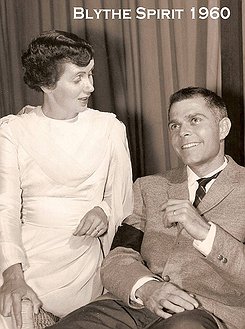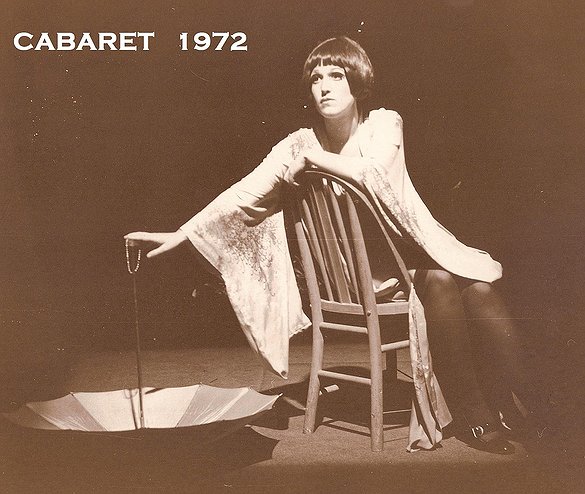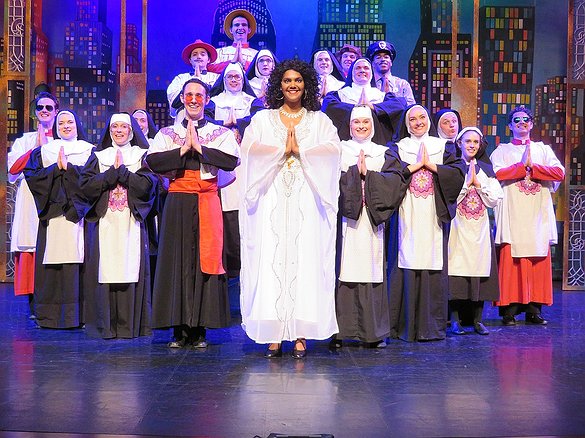65 years of show tunes and hard work at the Bigfork Summer Playhouse
Under the reins of Don and Jude Thomson, and their son Brach, the Bigfork Summer Playhouse has become one of the most notable small-town professional theater companies in the country, not missing a single season in its 65 years.
The Playhouse performs four musicals and a variety show about once a week during its annual run in the summertime. A college-aged cast is hired — roughly 3,000 apply every season for the 20 spots available. The program has churned out performers and crew members who go on to have successful careers in the arts like that of Oscar-winning actor J.K. Simmons.
The Playhouse is a past recipient of the Montana Governor’s Award for the Arts and boasts several Emmy and Oscar winners as part of its alumni. This year’s summer season begins on June 1.
Those who are lucky to join the cast or crew are guaranteed a great educational experience performing in a beautiful 435-seat theater for Flathead Lake’s summer crowd, with employee housing near Bigfork’s downtown.
But, things looked very different for the seasonal performers and crew when the shows began in the early 1960s. The company was founded in 1960 by Firman “Bo” Brown and his wife Margery Hunter Brown as a place for University of Montana theater students to perform in the summer, according to the Playhouse.
Don, a graduate student at the University of Montana, was hired as a technician in 1964. He designed and built scenery, but also appeared on stage as an actor. Soon after his first season, he would encourage Brown to hire his then-girlfriend, whom he met at college. Jude grew up in Kalispell and was studying music theory and composition at the University of Montana in Missoula.
“I ended up getting the job because Bo needed a keyboard player … He didn’t want to, but sort of ended up having to pick me,” Jude said with a laugh.
Back then, the company only had 15 people in its entirety, including one as the orchestra, which was Jude on keyboard. They performed mostly stage plays, like “The Rainmaker” in 1961 and “The Glass Menagerie” in 1962. The theater where they perform today didn’t exist — the company rented the community hall owned by the Masons and the Eastern Star, which seated approximately 200 people.
Following Brown’s departure, Don and Jude were hired to run the Playhouse in 1967 by a group called the Bigfork Development Company. They took out a contract with them that stated the couple could buy the theater company after five years, which they did. Don said he was teaching college in Nebraska at the time, and every summer they would load up their family and head back to Bigfork for another summer of shows.
Jude said those early years were a lot of fun, but after buying the Playhouse, the responsibilities set in.
“The more we got it was like, ‘OK, we’ve got to stop behaving like we’re children and start saying, ‘OK, this is what we’re going to do’... it was just a matter of maturing,” Jude said.
Jude’s talent for music and composition would influence the company after she and Don took over. They decided to perform exclusively musicals because it sold more tickets and allowed all performers to be in every show, as opposed to before, when there were separate actors for plays and musicals.
“It was better for us to do all musicals. That way everybody in the company was in every show — that was the way it got started and that’s the way it is today,” Don said.
In 1970, Don took a teaching job at C.M. Russell High School in Great Falls, making the seasonal commute to Bigfork easier.
“Teachers’ pay was not the grandest in the country, but we made it work and managed. We bought a trailer house eventually and left it here (in Bigfork,)” Don said.
“We owned our homes in both Nebraska and Great Falls. So we had places to come and go to all the time, it wasn’t a matter of racing around trying to find a place to live,” Jude added.
The couple also eventually got their sons involved, Brach and Gavin — both of whom would go on to have careers in the arts as adults.
Brach remembered what it was like when the Playhouse crew would put together the stage inside the community hall at the beginning of summer. He said it resembled a roller rink on the inside during the off-season, where people would skate, watch movies and the Eastern Star would gather.
“When that used to be the village square (the Bigfork Art and Cultural Center building) they used to store all of the risers, sets, seats and stage over there … And they built all those things up, they did it every year. I might have crawled under a riser or two,” Brach said.
In the 1980s, the Thomsons helped set up the Bigfork Center for the Performing Arts Foundation. According to the nonprofit’s website, in 1986 members committed to building a new theater for the Playhouse after the 50-year-old community hall was condemned by fire officials.
Moving at lightning speed, they were able to open the new theater in June 1988.
“It was a huge change in lots of ways because we didn’t have to spend the time going and getting the platforms, the seats and all the things that made the auditorium and the stage,” Don said.
The Playhouse could now tout a new theater (which they rent from the foundation) to its aspiring seasonal cast and crew. But, the program started to garner a reputation as a good place to cut your teeth as a performer — mostly by word of mouth.
“Because we’ve been doing these auditions for a long time at these specific places, (our seasonal performers) go back to their schools after they’ve had a summer with us and talk about how they had a great big time, that they worked really hard, but it was good. And some of the professors say ‘if Bigfork calls you back, go to it,’” Jude said.
Brach, who took over Jude’s position as director of music in 2004, said they look at auditions online and in person from people all over the country. From the Unified Professional Theatre Auditions to the Southeastern Theatre Conference, among others, Brach said they sometimes see between 150 to 280 auditions per day. They’ll watch someone sing and act, and if they like them, they’ll ask them to learn two dance routines.
“In some of those auditions, we’re competing with the cruise lines and the theme parks. You know, when you got Disneyland and Dollywood sitting right next to you, plus other regional theaters like us, and some of the national tours. If we like someone, so do 10 other companies,” Brach said.
One perk the company can offer is good employee housing. Don said they invested in what their seasonal employees call “the compound” in the late 1970s, a dorm building with apartments and set storage that is about four blocks away from the performing arts center.
“With that other things grew like a costume shop, a paint shop, a scene shop and a rehearsal space. One of the smartest things we ever did was still build that dormitory because in this day and age, it would be impossible to bring that many kids into an area for a short period of time,” Don said.
The dorm can house up to 50 people and every hire has their own room for the summer. Don said they’ve named different parts of the dorm after glamorous New York City hotels, like The Ritz Carlton and The Waldorf.
“When we’re talking to those kids at callback and we tell them about our housing, they write that down, because they’re looking at 15 other theaters … But you can see that gets their attention,” Jude said.
When the seasonal cast comes out to Montana, eventually people they know will follow. This has also helped the Playhouse’s reputation among colleges, Don said professors will often come out to see how their students are doing in the program. Like so many others, they instantly love the Big Sky state.
“They show up and they love Montana, and the parents especially come out and they see what the kids are doing and where they are, and they say ‘How’d you get a job like this in this kind of an area?’ They love it and we treat them right,” Don said.
Memories from the Playhouse bring many alumni back to Bigfork to visit the theater. Brach said occasionally, the group Simmons performed with will have a reunion in town. Along with the Oscar-winning actor, many performers and crew members went on to find great success in their careers after getting their start at the Playhouse.
Like John Schaffner, who got his start designing and building sets in Bigfork. He went on to win several awards for his set design work, including his sets on the show “Friends.” Daniel Erickson got his start at the Playhouse in 1976 as an actor and stage manager before going on to have a career acting in off-Broadway productions, TV commercials and shows like “Perry Mason.”
Many more alumni have gone on to be successful in other areas of the arts, whether that be in music education, regional theaters, traveling productions or on Broadway itself.
Don has been working on a book about the alumni, reaching out to 1,900 people who have worked for the company over the years.
“It’s been interesting to track them down. I started 2019 and that was a real task, but I got everybody with the exception of about 270 people,” Don said.
While it’s clear that the Thomson’s care about putting on a good show, the producers are equally as committed to giving a good experience to their seasonal staff. Brach said many companies have owners who hire and then play golf all summer, but their family is involved in everything that makes the Playhouse run.
“We do everything we can to make him feel like a family and like a company. We tell him upfront, ‘We’re going to work harder than any company ever. We promise you, we’ll work you harder. But we promise you’re going to love us for it when it’s over,’” Brach said.
They also give away scholarships to five of the student performers each summer. Typically, this is a scholarship of at least $1,000 each, but the intention is to increase that to $2,000 this year, to keep up with the rising cost of school. Over the years they have given out $265,000 in scholarships.
“We feel that if the kids walk away at the end of the summer, and they go, ‘That was a hell of a lot of work, and I’ve learned a lot and I hope they’re going to ask me to come back next year.’ That’s the goal,” Don said.
There’s little time to relax and enjoy, as there is always something to do in preparation for what’s coming next, says Brach. He is also the founder and producer of the Bigfork Playhouse Children’s Theater, which performs several shows in the off-season, including a robust run during the holidays. They share the performing arts center with the Bigfork Community Players, a community theater group also founded in part by Don.
Don and Jude don’t plan on stopping any time soon. When asked why they return each year, the couple started listing off jobs to be done, like manning the ticket booth and giving out the programs, but Brach interjected:
“Don’t let them kid you, they love what they do … when you love your job and it’s been your love forever, why quit?”
This summer the Playhouse will perform “Crazy for You,” “Beauty and the Beast,” “Footloose” and “Legally Blonde,” along with “Hits of the 50s, 60s, 70s and 80s.” Tickets and more information are available at bigforksummerplayhouse.com.







